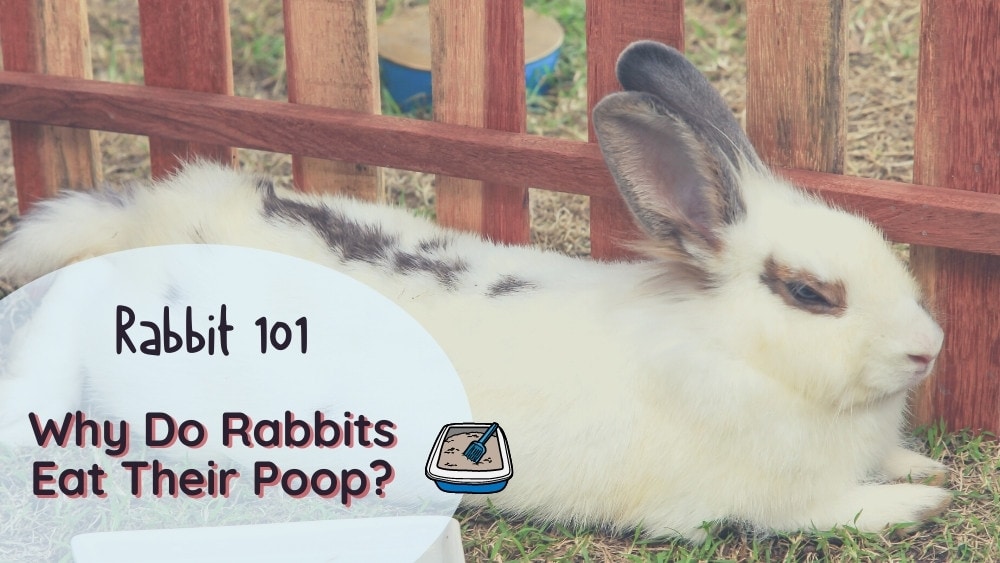You may not know it, but your cute pet rabbit is probably hiding a dirty secret. When the sun goes down, this lovable little creature engages in a habit that goes against all good hygiene: eating their own poop!
But why do rabbits eat their poop? Although they’re secretive about this behavior, you may catch them in the act and get worried about it. After all, animal feces are waste products, full of bacteria and maybe even parasites, and are NOT a part of a healthy – or polite! – dietary plan.
What you might not realize is that it’s essential for your rabbit to eat their poop. In this article, we’ll take a science-based approach to help you work out if your rabbit’s poop-eating habit is something to worry about, or a smart evolutionary adaptation.
We’ll look at:
- Why rabbits eat their own poop
- How the rabbit digestive system works, and the two types of rabbit poop they produce
- What happens when your rabbit eats its own poop
- Should you stop your rabbit from eating its own poop?
So if you’re ready to learn more about your pet’s unusual secret, let’s dive in!
Why Do Rabbits Eat Their Poop?
Rabbits eat their own poop, a behavior known as coprophagy, to maximize the important nutrients they can get from the high-fiber, low-quality food they eat in the wild. While other animals like cows have four stomachs to help them digest grass, rabbits manage the problem by sending their food through the digestive process twice.
How Does the Rabbit Digestive System Work?
Rabbits are foraging herbivores that mainly feed on grass and other fibrous plant material.
A rabbit’s digestive system can’t digest food efficiently when it passes through the first time, so they have a special evolutionary adaptation to help them get the nutrition they need.
When food reaches the rabbit’s large intestine, undigested material is grouped into two parts: indigestible fiber, and nutrient-rich matter. These go on to form two different types of rabbit poop.
What Kinds of Poop Do Rabbits Produce?
Rabbits produce two types of poop – fecal pellets and cecotrophs.
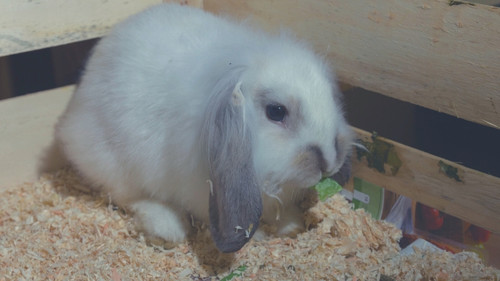
Fecal Pellets
When indigestible fiber reaches the large intestine, it is squeezed dry and released as normal rabbit fecal pellets. These fecal pellets are the small, brown ‘cocoa puffs’ seen in a litter box and scattered around a rabbit’s cage.
Fecal pellets are produced during the day and are usually not consumed, though they aren’t harmful if eaten. They are rabbits’ final waste products, which come out dry with a hay-like texture and easily crumble between your fingers.
Cecotrophs
Nutrient-rich matter progresses to the cecum, where numerous bacteria ferment and break it down further. This process, called hindgut fermentation, results in material that has high nutritional value. It is compacted into soft pellets called cecotrophs.
Cecotrophs are a special type of rabbit poop comprising small, soft, shiny pellets coated in a layer of rubbery mucus and released in an elongated mass resembling a bunch of grapes.
Cecotrophs have a sticky texture, pungent odor, and less fiber than ordinary rabbit droppings. They contain protein and B vitamins essential to rabbits’ health.
Since the hindgut fermentation process occurs at the end of the digestive tract, your rabbit can’t absorb any of these nutrients directly.
When the material is excreted as cecotrophs, these special feces are loaded with nutrients that were not extracted as the food passed through the digestive system the first time.
Once cecotrophs have been formed, a neurological signal is sent to the brain for the rabbit to feed on them as they exit the anus.
What Happens when Rabbits Eat Their Own Poop?
When a rabbit eats their cecotrophs, they go through the digestive system a second time. The mucus layer on cecotrophs protects cecal bacteria against stomach enzymes.
When cecotrophs reach the small intestine, nutrients are absorbed, and cecal bacteria are deposited at the cecum to continue fermentation. After absorption of all the nutrients, the cecotrophs are pressed dry and released as fecal pellets.
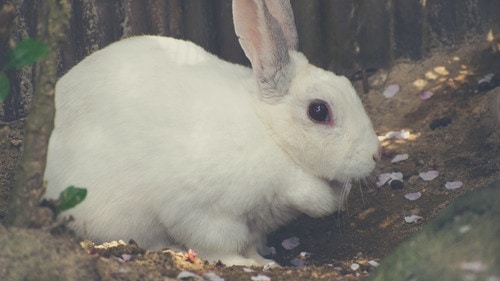
This process allows the rabbit’s body to extract all the nutrients before excreting them as fecal pellets. Cecotrophs contain more protein and vitamins derived from the rabbits’ diet, based on high-fiber items like grass and leafy greens.
They also contain beneficial cecal bacteria, which are deposited in the cecum. Eating cecotrophs cushions rabbits against deficiencies and helps keep their digestive process running smoothly.
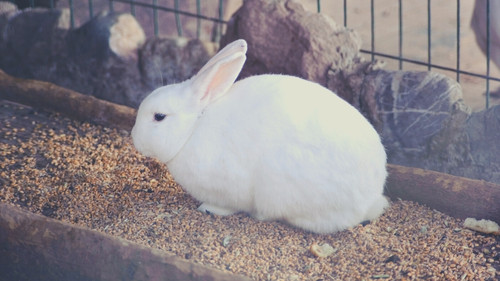
Rabbits usually eat cecotrophs, or soft feces, directly from their anus, so you rarely see them. This process is called coprophagy or cecotrophy. A few cecotrophs are released during the day, and plenty at night or in the early morning.
Should You Stop Your Rabbit from Eating Its Own Poop?
No. Cecotrophy is important for your rabbit’s health, and you should not try to prevent it. Preventing your rabbit from eating poop can deprive them of all the extra nutrition from their diet that they weren’t able to absorb the first time around.
Studies have shown that preventing cecotrophy can lead to a decrease in protein digestibility and the digestibility of dry matter in a rabbit’s diet. It can also lead to malnutrition and increase the risk of opportunistic illnesses.
Occasionally, some rabbits may consume their hard droppings, which are not cecotrophs. Although they cause no harm, these droppings have no nutritional value for your pet.
If your rabbit eats its pellet poop instead of cecotrophs, try not to discourage it. Instead, empty the litter box frequently, so it doesn’t eat them.
Frequently Asked Questions
What is Coprophagy in Rabbits?
Coprophagy is the behavior of rabbits eating their own poop. While they don’t usually eat their normal stools, or fecal pellets, they should be eating cecotrophs every day.
Why don’t I See Cecotrophs in my Rabbit’s Enclosure?
Your rabbit eats their cecotrophs, or night feces, directly from their bottom, so it’s unusual for a rabbit owner to see them. The only time you’ll see cecotrophs in your rabbit’s hutch is when your bunny is sick and unable to eat them.
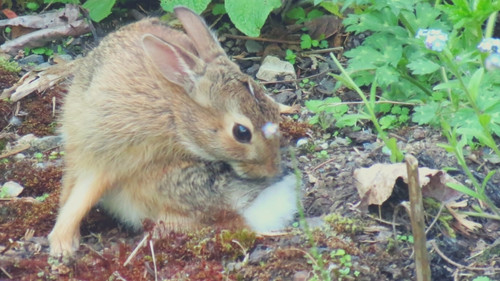
What are the signs that rabbits eat their own feces?
It can be rare for a rabbit owner to witness their rabbit eating its own poop. One of the signs is spotting your rabbit bending over and licking its bottom. If you never see your rabbit’s cecotrophs, it indicates they are being consumed.
However, if you see many cecotrophs, it’s a sign that your rabbit is either producing an excessive amount, or has stopped eating them. This could be due to poor diet, pain when reaching down to eat the cecotrophs, or another issue. Left unchecked, it can lead to flystrike which can be fatal.
Seek veterinary treatment as soon as possible if you notice uneaten cecotrophs in your rabbit’s enclosure, or sticky poop around their bottom.
What is a healthy rabbit diet?
Coprophagy is a normal rabbit behavior that depends on a healthy diet. A healthy rabbit diet comprises grass, hay, leafy greens, and fresh vegetables.
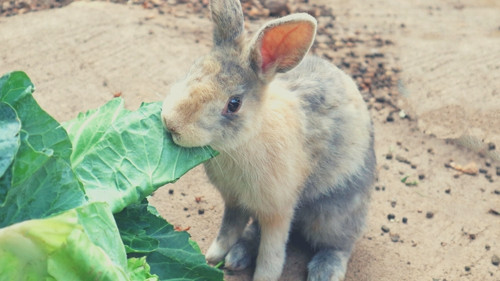
A poor diet can cause the production of an excessive number of cecotrophs which your rabbit may not consume completely. It may also trigger other digestive issues, such as runny stool.
Conclusion
It is normal for rabbits, whether wild or domesticated, to eat their own poop. This is known as coprophagy or cecotrophy. It is an adaptation that ensures the rabbit maximizes the nutrients they can get from their food.
Rabbit pets shouldn’t be discouraged from eating their droppings, since that would deny this wonderful source of nutrients in their diet. Providing a healthy diet with plenty of fiber can help facilitate a smooth digestive process, allowing your rabbit to enjoy the benefits of coprophagy.
Knowing how to recognize the two types of rabbit poop can help you detect whether your bunny is eating its cecotrophs, and to know when things go wrong so that you can seek veterinary help.


